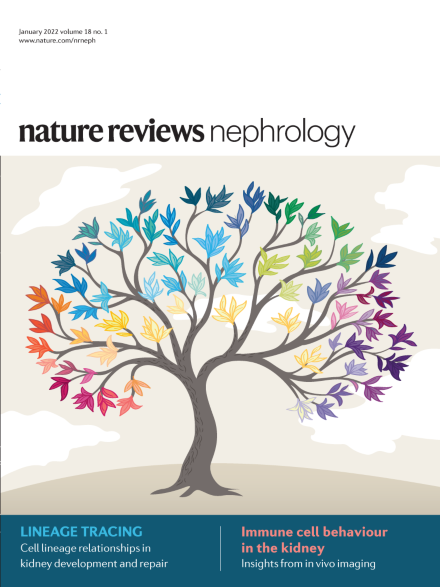Global landscape of kidney health across Indigenous populations.
IF 39.8
1区 医学
Q1 UROLOGY & NEPHROLOGY
引用次数: 0
Abstract
Approximately 480 million individuals worldwide (~6% of the global population) are Indigenous peoples. Despite their diverse cultures and histories, the shared legacy of colonialism has profoundly shaped their health and socioeconomic status. This legacy is deeply intertwined with poverty, systemic racism and historical trauma, contributing to significant health disparities compared with non-Indigenous populations. Among the many chronic diseases disproportionately affecting Indigenous peoples, chronic kidney disease (CKD) stands out as a major public health concern. Indigenous peoples experience higher rates of CKD, yet they often face barriers to accessing responsive and culturally safe health-care services. Factors such as geographic isolation, socioeconomic disadvantages and systemic discrimination limit their access to preventive care, early disease detection and kidney replacement therapy, leading to worse health outcomes and higher mortality rates. Exposure to environmental and occupational risks and inadequate infrastructure further exacerbate CKD risk for Indigenous peoples. Here, we examine determinants of kidney disease and health among major Indigenous populations in Africa, Asia, Australia, Canada, Latin America, Aotearoa-New Zealand, the Pacific Islands and the USA. We discuss culturally safe and responsive strategies that can improve the delivery of kidney care and make policy recommendations for multiple levels of government to ensure health-care systems are equipped to meet the needs of Indigenous communities. By addressing these gaps and promoting cultural competence in kidney care, health-care providers can have a crucial role in reducing health disparities and improving Indigenous peoples' kidney health worldwide.全球土著居民肾脏健康状况。
全世界约有4.8亿人(约占全球人口的6%)是土著人民。尽管他们的文化和历史各不相同,但殖民主义的共同遗产深刻地影响了他们的健康和社会经济地位。这一遗产与贫困、系统性种族主义和历史创伤深深交织在一起,导致与非土著人口相比存在巨大的健康差距。在影响土著人民的许多慢性病中,慢性肾病(CKD)作为一个主要的公共卫生问题脱颖而出。土著人民患慢性肾病的比率较高,但他们在获得反应迅速且文化上安全的保健服务方面往往面临障碍。地理隔离、社会经济劣势和系统性歧视等因素限制了他们获得预防保健、早期疾病检测和肾脏替代治疗的机会,导致健康结果更差,死亡率更高。暴露于环境和职业风险以及基础设施不足进一步加剧了土著人民的慢性肾病风险。在这里,我们研究了在非洲、亚洲、澳大利亚、加拿大、拉丁美洲、新西兰、太平洋岛屿和美国的主要土著人口中肾脏疾病和健康的决定因素。我们讨论了文化上安全和响应性的策略,这些策略可以改善肾脏护理的提供,并为各级政府提出政策建议,以确保医疗保健系统能够满足土著社区的需求。通过解决这些差距和促进肾脏护理方面的文化能力,保健提供者可以在缩小健康差距和改善全世界土著人民肾脏健康方面发挥关键作用。
本文章由计算机程序翻译,如有差异,请以英文原文为准。
求助全文
约1分钟内获得全文
求助全文
来源期刊

Nature Reviews Nephrology
医学-泌尿学与肾脏学
CiteScore
39.00
自引率
1.20%
发文量
127
审稿时长
6-12 weeks
期刊介绍:
Nature Reviews Nephrology aims to be the premier source of reviews and commentaries for the scientific communities it serves.
It strives to publish authoritative, accessible articles.
Articles are enhanced with clearly understandable figures, tables, and other display items.
Nature Reviews Nephrology publishes Research Highlights, News & Views, Comments, Reviews, Perspectives, and Consensus Statements.
The content is relevant to nephrologists and basic science researchers.
The broad scope of the journal ensures that the work reaches the widest possible audience.
 求助内容:
求助内容: 应助结果提醒方式:
应助结果提醒方式:


